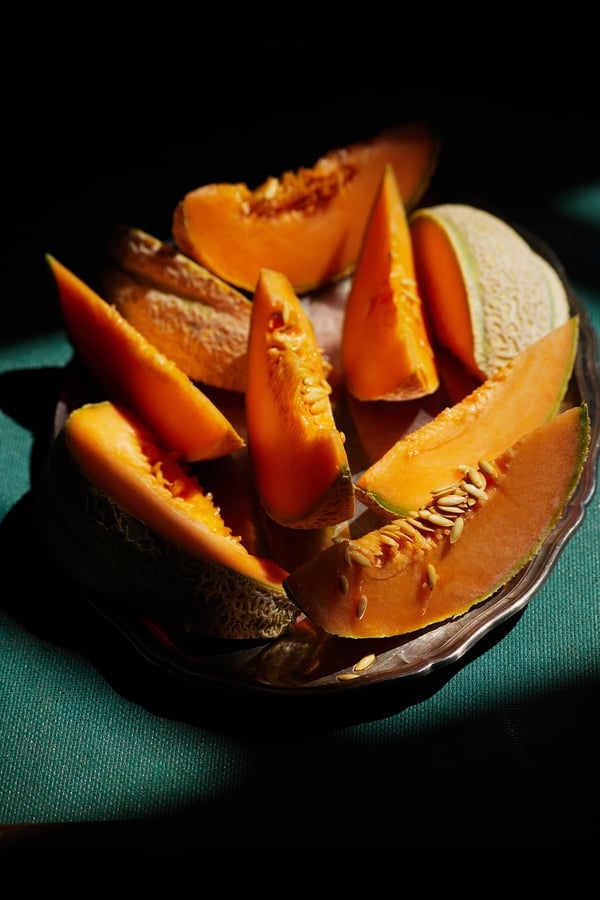
Summer is here, in all of its humid glory. The stands at the farmers’ markets are teeming with fresh vegetables and fruits, thank goodness, because I for one may not turn on my stove or oven until October. As I was strategizing about how best to eat my vegetables without breaking a sweat, I realized that summer eating is much easier when you’re equipped with the right skills and tools to break down all of that amazing seasonal produce.
Here’s how to wield your sharpest knife (and skills) to make the most of summer eating.
1. Cut corn from the cob without making a mess
As much as I love getting my hands buttery and eating an ear of corn right from the cob, more often, I prefer to cut the corn off to use in salads, pastas, and even salsas. I struggled with this in the past, especially because it’s a hard thing to do cleanly and safely. Here’s how I found my groove: immediately after cooking the corn and before seasoning it or adding any butter, put the tip of the ear into the hole of a bundt cake tin. Use a large, serrated knife to cut the cobs off, then pour the kernels that gather in the tin into your cooking and discard the cob (or save it for corn stock!).
2. Chiffonade herbs without bruising them
There’s nothing better than fresh herbs, especially basil and mint, for topping summer salads and pasta. I buy herbs in bulk from the farmers at the local market and then process them when I get home, which usually means a long time chopping away in the kitchen. I used to get tired when I tackled a task this big, but after taking the Knife Skills class at The Chopping Block, I learned the proper grip to use to control my knife and my cuts got a lot easier. Pro tip? Using a freshly-sharpened knife is best for this task: if your knife is too dull, you’ll end up bruising the herbs instead of chopping them cleanly.
3. Slicing tomatoes without ruining the skin
There’s nothing better than summer tomatoes! But there’s nothing worse than cleaning up the soggy, wet mess that’s left behind after chopping them. To avoid the mess, make sure you have the right knife picked out: for peeling, go for a paring knife, but for slicing heirlooms for sandwiches or caprese salad, grab your serrated knife. The teeth of the serrated knife break through the skin cleanly instead of the flat blades that require sawing. Your slices will be much more intact and there’ll be less of a mess to clean up afterwards. Making a sauce or salsa? Try using a grater with overripe tomatoes to break them down instead.
4. Breaking down a melon into bite-sized pieces
I am so excited for melon season! One of the farmers at the market told me it’s just around the corner, and I can’t wait. Serving slices of melon or making a melon salad is one of my favorite summer dinner party moves. But with melons as big as they get under the hot summer sun, it’s important to use the right tools to cut into them safely. Most important? A slip-proof cutting board, preferably with a groove to catch all of the juices. This will give you a solid surface to start with when you’re cutting the melon. It’s also best to have a large chef’s knife that’s sturdy and reliable—and the right size for you. Too big, and you’ll have trouble controlling the cuts. Too small, and you’ll never make it through the whole fruit at a time.

5. Trimming and slicing peppers quickly
As much as I love a little bit of spice, not all of my guests do. When I’m cooking for company, I try to remove seeds and most of the pepper membrane before using them, whether in pickles, salads, or for crudite plates. I learned that if you use a small, sharp paring knife to slice the top off of the pepper, then make a small cut lengthwise, it’s easy to unfold the pepper and use the knife to scrape out the spicy stuff inside. One heads up: make sure to wear gloves and wash your hands thoroughly after cutting peppers. The spicy compound in peppers can really sting if it gets in your eyes.
 Could your knife skills use some sharpening? Join us for one of these upcoming Knife Skills classes. It's our most popular class for a reason!
Could your knife skills use some sharpening? Join us for one of these upcoming Knife Skills classes. It's our most popular class for a reason!

